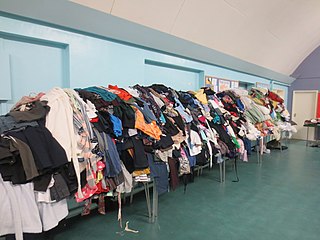Related Research Articles

Española is a city primarily in Rio Arriba County, New Mexico, in the United States. A portion of the central and eastern section of the city is in Santa Fe County. Founded as a capital for Nuevo México in 1598 as San Juan de los Caballeros, it was renamed Española in 1880 when it became a railroad village, the city was officially incorporated in 1925. It has been called the first capital city in the United States. At the 2010 census, the city had a total population of 10,495. Española is within the Albuquerque–Santa Fe–Las Vegas combined statistical area.

Goodwill Industries International Inc., or shortened to Goodwill, is an American nonprofit 501(c)(3) organization that provides job training, employment placement services, and other community-based programs for people who have barriers preventing them from otherwise obtaining a job. Additionally, Goodwill Industries may hire veterans and individuals who lack education or job experience or face employment challenges. Goodwill is funded by a massive network of retail thrift stores which operate as nonprofits as well. Goodwill's answer to its profit status is "As a unique hybrid called a social enterprise, we defy traditional distinctions. Instead of a single bottom line of profit, we hold ourselves accountable to a triple bottom line of people, planet, and performance."

A charity shop (UK), thrift shop or thrift store (USA) or opportunity shop (others) is a retail establishment run by a charitable organization to raise money. Charity shops are a type of social enterprise. They sell mainly used goods such as clothing, books, music albums, DVDs, toys and furniture donated by members of the public, and are often staffed by volunteers. Because the items for sale were obtained for free, and business costs are low, the items can be sold at competitive prices. After costs are paid, all remaining income from the sales is used in accord with the organization's stated charitable purpose. Costs include purchase and/or depreciation of fixtures, operating costs and the building lease or mortgage.

Savers, Inc. headquartered in Bellevue, Washington, U.S., is a privately held for-profit thrift store chain offering second hand shopping. An international company, Savers has more than 315 locations throughout the United States, Canada, and Australia, and receives its merchandise by paying money to non-profit organizations for donated clothing and household items, and through direct donation by individuals. Savers is known as Value Village in the Pacific Northwest of the U.S. and most of Canada, and Village des Valeurs in Quebec. In Australia and other regions of the U.S., the stores share the corporation's name.

A secondhand or used good is a piece of personal property that is being purchased by or otherwise transferred to a second or later end user. A used good can also simply mean it is no longer in the same condition as it was when transferred to the current owner. When the term used means that an item has expended its purpose, it is typically called garbage, instead.

Give-away shops, freeshops, free stores or swap shops are stores where all goods are free. They are similar to charity shops, with mostly second-hand items—only everything is available at no cost. Whether it is a book, a piece of furniture, a garment or a household item, it is all freely given away, although some operate a one-in, one-out–type policy. The free store is a form of constructive direct action that provides a shopping alternative to a monetary framework, allowing people to exchange goods and services outside of a money-based economy.

A jumble sale, bring and buy sale or rummage sale is an event at which second hand goods are sold, usually by an institution such as a local Boys' Brigade Company, Scout group, or church, as a fundraising or charitable effort. A rummage sale by a church is called a church sale or white elephant sale, frequently as part of a church bazaar.
Consignment is the act of consigning, the act of giving over to another person or agent's charge, custody or care any material or goods but retaining legal ownership until the material or goods are sold. That may be done for the purpose of shipping the goods, transferring the goods to auction or intending the goods to be placed on sale in a store.
In charitable organizations, a drive is a collection of items for people who need them, such as clothing, used items, books, canned food, cars, etc. Some drives are that people go through their inventory, bag the items up, and put them in a giveaway bin, or charitable organizations such as Big Brothers Big Sisters, The Salvation Army come to the house and pick them up. They then put the items in their thrift stores or, if they don't have any, sell them to thrift stores to raise money for their organization.
Gifts in kind, also referred to as in-kind donations, is a kind of charitable giving in which, instead of giving money to buy needed goods and services, the goods and services themselves are given. Gifts in kind are distinguished from gifts of cash or stock. Some types of gifts in kind are appropriate, but others are not. Examples of in-kind gifts include goods like food, clothing, medicines, furniture, office equipment, and building materials. Performance of services, such as building an orphanage, providing office space or offering administrative support, may also be counted as in-kind gifts.
Deseret Industries (DI) is a non-profit organization and a division of the welfare services provided by The Church of Jesus Christ of Latter-day Saints.

A second-hand shop is a shop which sells goods that are not new.

Edward Bernard Grothus was an American machinist and technician at the Los Alamos National Laboratory during the 1950s and 1960s. In later life he became the owner of a surplus store which he used as a base for peace and anti-nuclear activism.
Housing Works is a New York City based non-profit fighting AIDS and homelessness. The charity is well known for its entrepreneurial businesses including a chain of Thrift Shops, which supports efforts to end AIDS and homelessness. They are also known for their social justice activism. As of March 2017, the organization has served 30,000 clients.

Los Alamos is a town in Los Alamos County, New Mexico, United States, that is recognized as the development and creation place of the atomic bomb—the primary objective of the Manhattan Project by Los Alamos National Laboratory during World War II. The town is located on four mesas of the Pajarito Plateau, and has a population of 12,019. It is the county seat and one of two population centers in the county known as census-designated places (CDPs); the other is White Rock.

In Kind Direct is a charity in the United Kingdom founded in 1996 by the Prince of Wales. The charity distributes new donated usable consumer goods from manufacturers and retailers to UK charities working both domestically and abroad. The Prince of Wales is In Kind Direct's Royal founding patron. Robin Boles was In Kind Direct's CEO from 1996 until her retirement 2019. The role of CEO was taken on by Rosanne Gray in December 2019.
Mesita may refer to:

Beautiful Store is a Korean nonprofit organization and charity shop. It was launched in 2002, following the model of the Oxfam shop, and now operates over 100 stores across Korea. The volunteer-run store collects donations of old or worn-out items like clothing, books, bags, kitchenware and appliances, and sells them to raise money for charity.
Web Thrift Store was an organization based in New York City that facilitates non-profit organizations to raise money through it. It was founded in 2011 by Doug Kurgman and Lynn Zises. According to their website, Web Thrift Store is now closed.

The 3000 Club is a Phoenix-based charity which works with food banks in Arizona in order to reduce food waste. The 3000 Club's main program is known as Market on the Move, although the organization provides other services for Arizona communities. Their mission statement is "Providing life saving fresh fruits and vegetables to impoverished families."
References
- 1 2 Casa Mesita: A special place to call home [ permanent dead link ] Los Alamos Monitor (newspaper) story 12 December 2005.
- ↑ Give and take [ permanent dead link ]: Los Alamos Monitor (newspaper), 17 August 2007
- ↑ Clark, Carol (2009-07-01). "Casa Mesita re-opens its doors". www.lamonitor.com. Retrieved 2019-12-23.
- ↑ New Mexico Criminal Justice Resource Directory Archived October 9, 2006, at the Wayback Machine
- ↑ New Mexico Juvenile Justice Program Inventory Archived October 10, 2006, at the Wayback Machine